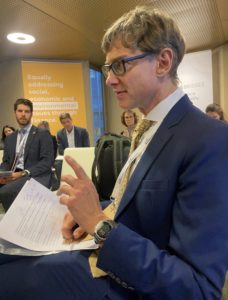NORRAG Participates in Sustainability Finance Conference ‘Building Bridges’
On 11 December, NORRAG Executive Director, Dr Moira Faul, participated in a fishbowl-style panel titled “Moving the Needle in the Scale up of Funding for OBF Education Programs.” The panel was part of the 2024 Building Bridges finance conference, which took place in Geneva and was co-organised by the Education Outcomes Fund (EOF) and UBS Optimus Foundation.
The event—centred around the commitment to education and to reaching the most marginalized children and youth, given the current scale of financing needs—explored if and how Outcomes-Based Financing (OBF) can identify additional funding opportunities beyond the traditional government and foundation-based funding channels. Throughout the event, EOF CEO Amel Karboul invited audience members to take part in the discussion with experts, which included Anita Kover, Investments Director of the UBS Optimus Foundation, Arif Neky, Senior Advisor for UN Strategic Partnerships at the Resident Coordinator’s Office and National Coordinator of the SDG Partnership Platform in Kenya, and Maximilian Martin, Global Head of Philanthropy at the Lombard Odier Group.
The conversation began with exploring success stories demonstrating the effects and advantages of OBF for governments, philanthropic organisations, and private investors. Dr Faul highlighted a growing desire among investors and funding organisations to learn and improve how they finance and monitor initiatives. She mentioned NORRAG’s partnership with UBS Optimus Foundation and Volta Capital and research partners in India and South Africa on the IFE-2-Leave No One Behind project and how there was a strong interest in collecting and analysing data as projects unfold, which supports reflection, learning, and course correction in time to make a difference to outcomes, rather than just simply informing implementers and funder at project end. Maximilian Martin made three key reflections. Firstly, education is the great equaliser of opportunity, although it is often underappreciated. Secondly, impact bonds have been working in the education space. Thirdly, the main challenge in promoting OBF is that this field is highly technical and implementers and investors need to work on improving the narrative around it.
The panel then considered challenges and barriers preventing large-scale implementation of OBF initiatives. Arif Neky highlighted the difficulties of implementing new financing models in contexts and countries historically relying on grants-based funding. While cautiously optimistic, he also pointed out the challenge of convincing governments about alternative financing models. 
According to Maximilian Martin, there are three main obstacles. Firstly, there needs to be more Outcomes-Based Financing available. Secondly, transaction costs for OBF must be lowered. Lastly, more work should be done to change the narrative around OBF and make it more attractive. This last aspect must be worked on by implementers who have experience working with OBF and know how the model works and what its limitations are.
Dr Faul contributed to the discussion by stressing that organizations implementing education programs on the ground cannot survive on OBF or deliverables payments alone. OBF initiatives operate through education systems that have a decades-long history of investment from public and family sources. Can OBF find ways to support those education systems?
The event concluded with a brief conversation over what the future holds for OBF. Anita Kover of UBS Optimus Foundation described the pooled fund that UBS Optimus has set up to reduce philanthropic funding by attracting other investors, including public financing through multilateral banks. Maximilian Martin highlighted the need for financing institutions to scale successful initiatives. The greatest challenge for scaling, according to Arif Neky, would be institutionalising these changes in government and national systems rather than continuing a series of never-ending experimental pilots. Dr Faul emphasized that the focus should be on collaborative learning and financing and intermediary organisations’ courage to learn as their projects unfold.
Speakers:
- Moira Faul, Executive Director, NORRAG
- Amel Karboul, CEO, Education Outcomes Fund (EOF)
- Anita Kover, Director, Investments, UBS Optimus Foundation
- Arif Neky, Senior Advisor for UN Strategic Partnerships at the Resident Coordinator’s Office in Kenya and the National Coordinator of the SDG Partnership Platform
- Maximilian Martin, Global Head of Philanthropy, Lombard Odier

